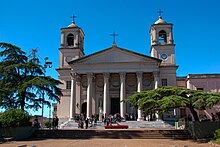Religion in Uruguay (2021)
Roman Catholic (44.8%) Other Christian (9.5%) No religion (44.5%) Other (1.2%)| This article is part of a series on the |
| Culture of Uruguay |
|---|
 |
| People |
| Languages |
| Cuisine |
| Feasts and festivals |
| Religion |
| Arts and literature |
| Music |
| Media |
| Sports |
|
Uruguay Portal |
|
|

Christianity is the largest religion in Uruguay, with Catholics having the most adherents, but around 44.5% of the population is non-religious as of 2021. Church and state are officially separated since 1916.
Discrimination along religious lines is punishable by law, and the government generally respects people's religious freedom. However, apart from Christianity and to a lesser extent Umbanda and Judaism, other world religions such as Islam, Buddhism and Hinduism, etc. have a negligible presence in country.
Demographics

According to a 2014 survey by the Pew Research Center, 57% of the population has a Christian background (42% Catholic and 15% Protestant), 37% said they were religious but unaffiliated, and 6% were 'other religion' which includes Baha'is, Buddhists, Jehovah’s Witnesses, The Church of Jesus Christ of Latter-day Saints (Church of Jesus Christ), the Valdense Church, Afro-Umbandists (a mix of Catholicism with African and Indigenous traditional), Buddhists, the (Unification Church, and Brahma Kumaris, along with a small number of Jews, Hindus and Muslims.
Although the majority of Uruguayans do not actively practice a religion, they are nominally members of the Catholic church. However, Protestants are more active. The first Anglican church in the country was erected in 1844 by British traders, and is considered a historical landmark. Other religious groups in Uruguay include the Jehovah's Witnesses and the Mennonites. It is widely considered the most secular nation in the Americas. One cause of this was that Spanish colonial missions sent priests to convert indigenous people, who had always been a very small population in Uruguay.
According to a study by Latinobarómetro in 2010, 39% of Uruguayans are Roman Catholics and 11% are Evangelical Protestants. 3% of the population practices other religions such as Buddhism, Judaism, Islam. Within that 3% are included those who refused to answer the survey.
| Official survey results | 2006 | 2007 | 2021 |
|---|---|---|---|
| Christianity | 56.1 | 55.6 | 54.3 |
| Catholic | 46.0 | 45.1 | 44.8 |
| Other Christian | 10.1 | 10.5 | 9.5 |
| No religion | 42.6 | 42.9 | 44.5 |
| Deism | 26.9 | 27.8 | 30.1 |
| Atheism | 15.7 | 15.1 | 12.3 |
| Agnosticism | 2.1 | ||
| Animist and Umbanda | 0.6 | 0.7 | 0.7 |
| Jewish | 0.4 | 0.4 | 0.3 |
| Other | 0.3 | 0.4 | 0.2 |
Religious freedom
The Constitution of Uruguay provides for the freedom of religion and states that "the State supports no religion". Discrimination on religious grounds is illegal. The National Institute of Human Rights, part of the parliament, hears complaints of religious discrimination and conducts investigations, ultimately deciding whether the case should receive a judicial or administrative hearing. The institute also provides free legal resources to complainants.
Religious groups may register with the government as nonprofit organizations in order to receive tax breaks. Local government regulates the use of public land for burials. Many departments allow for all religious groups to use public cemeteries.
Religious instruction is prohibited in public schools. Although public schools close for certain Christian holidays, the government does not refer to these holidays by their Christian names. Students belonging to other religions may miss classes to observe their religious traditions without penalty. Private schools may decide which holidays to observe.
In 2022, Jewish leaders reported continuing antisemitic press and social media commentary; Muslim leaders stated that it can be difficult to convince private sector employers to respect prayer times during work hours and to obtain permission to leave work early to attend Friday prayers, but this is mainly due to lack of knowledge rather than deliberate discrimination.
In 2023, the country was scored 4 out of 4 for religious freedom by Freedom House, a US government funded think tank.
See also
- Roman Catholic Church in Uruguay
- Irreligion in Uruguay
- Hinduism in Uruguay
- Islam in Uruguay
- Judaism in Uruguay
- Bahá'í Faith in Uruguay
References
- "Los uruguayos y la religión". 7 February 2019.
- Public Opinion Uruguay, article dated 7 February 2019
- US Library of Congress
- ^ US State Dept 2022 report
- "Encuesta Nacional de Hogares Amplidada - 2006" (PDF). National Institute of Statistics (in Spanish). INHA. Archived from the original (PDF) on 27 September 2013. Retrieved 7 September 2013.
- Leslie Jermyn; Winnie Wong (2009). Uruguay. Marshall Cavendish. p. 77. ISBN 978-0-7614-4482-4. Retrieved 22 February 2016.
- "Latinobarometro, Database". PNUD. Archived from the original on 24 September 2014. Retrieved 10 September 2014.
- "Encuesta Continua de Hogares (ECH) - Instituto Nacional de Estadística". www.ine.gub.uy. Retrieved 2019-02-17.
- Freedom House website, retrieved 2023-08-08
External links
| Religion in South America | |
|---|---|
| Sovereign states | |
| Dependencies and other territories | |
